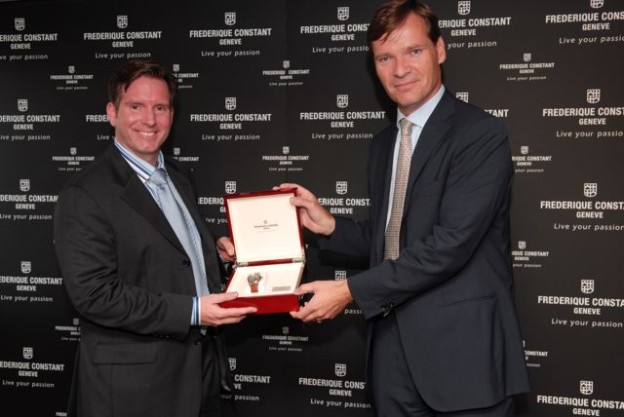
Peter: That included computers and televisions which could be connected to computers. Those were rather complex products and they depended on a comprehensive strategy. My responsibility was to develop product concepts and submit them to Eindhoven. Then we were supposed to place and sell the products that had been produced expressly for the Asian market. (1) Aletta: Philips' internal political aspects played a major role here too. Peter: Here’s one example: I had created an allinone computer. There were the most widely diverse responsibilities and competencies. In a nutshell, the business ran rather sluggishly. Aletta: That was 1995. I was already busily expanding our watch business. Peter had designed products and accompanied the entire project, but daily business activities were in my hands. In this context, it was necessary to visit customers from time to time. But that wasn't possible for me in Japan because the Japanese wouldn't accept a woman. So Peter had no other choice: every six months, he would take Friday off. After work on Thursday evening, we would fly with a case full of watches to Tokyo or Osaka, where we had big customers. He usually returned with orders for a few thousand watches worth several hundred thousand guilders. Peter: Every Monday morning there would be a department meeting at Philips. I was 32 at the time and the youngest person at the conference table. My colleagues were in their forties and my boss, the CEO of Philips Consumer Electronics Asia, was about 55. Basically, all one had to do was listen to how the inhouse political systems function at Philips: who said what to whom and who had received a promotion. Discussions were often loud and sometimes quite heated. There was almost no talk about products. None other than this boss, who had lived in Japan for eight years, emphatically stated that Europeans would never be able to sell successfully in Japan because the Japanese simply don't accept us and our products. I had to bite my lip to suppress a grin, especially on a Monday morning when I had just returned from a successful trip to Japan. Needless to say, I couldn't contradict him by saying that success was indeed possible. Aletta: In 1997, they were discussing the idea of closing the division in Hong Kong and relocating it in Singapore. Peter had been with Philips for eight years and this was definitely the last straw. Even a full year after he had submitted his resignation, he would still sometimes dream about Philips. That's how profoundly it had affected him. Peter: And I wasn't so deeply involved. I had other colleagues for whom Philips was the beall and endall of their existence. Their lives revolved around the company. Aletta: That's why on some weekends Peter would ask himself whether he really wanted to spend the rest of his life working for Philips. Time and again, we would consider the idea of building up a business of our own. Peter: We had the background. After studying economics, my first job was with a consulting firm. But it became increasingly clear to me that I would rather work for a Dutch company which develops and manufactures products. I wasn't interested in petroleum, foodstuffs or cleansing agents, so that ruled out Shell and Unilever. Philips was a good alternative: it made televisions, audio, lighting products and household appliances, it had a staff of 170,000 and it enjoyed a good reputation. That seemed promising. With my plans for an international career, they wanted me to start immediately. Aletta: Peter enjoyed his first years at Philips. The opportunities were tremendous. Expanding a division in Hong Kong enabled him to gain a treasure trove of experience and knowhow.
No Fields Found.

